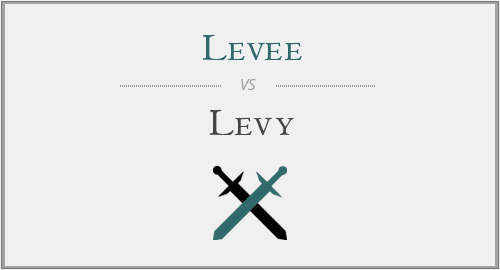Levee vs. Levy
So, “levee” and “levy” sound very similar – we’ve already confirmed that. But apart from this similarity and their vaguely similar spelling, there’s nothing else that connects these two words. Their definitions are completely unrelated.
While “levee” is only ever used as a noun, “levy” only appears defined in reputable dictionaries as a verb. So, from the way they are used in sentence, verb or noun, you already have a great clue indicating which word people are referring to. And now, so you know exactly what they’re talking about, read the in-detail explanations and examples below to see what each of these words actually mean.
When do we use “levee”?
Defined as a noun only, a “levee” is an embankment, built to prevent inundation, or a dike that limits irrigation on inundated land.
Example: They build a levee across the river to make sure inundations were prevented. – “levee” is an embankment that helps prevent inundation.
When do we use “levy”?

On the other hand, “levy” is only ever used as a verb, reflecting the action of demanding money, usually in an official or formal context. It usually refers to imposing taxes, collecting money or confiscating property.
Example: They will levy a new tax on consumers of luxury goods. – “levy” defines the action of officially demanding money.
Conclusion
The pair of words “levee vs. levy” is a great example of homophones, which means they sound the same even though they have different spellings. Hence, we are talking about two different words with completely different meanings and functions.
It’s essential to keep in mind that “levee” is only ever a noun, defining an embankment that prevents inundation, whereas “levy” is only ever a verb, with the meaning of officially demanding money.




Have a discussion about this article with the community:
Report Comment
We're doing our best to make sure our content is useful, accurate and safe.
If by any chance you spot an inappropriate comment while navigating through our website please use this form to let us know, and we'll take care of it shortly.
Attachment
You need to be logged in to favorite.
Log In